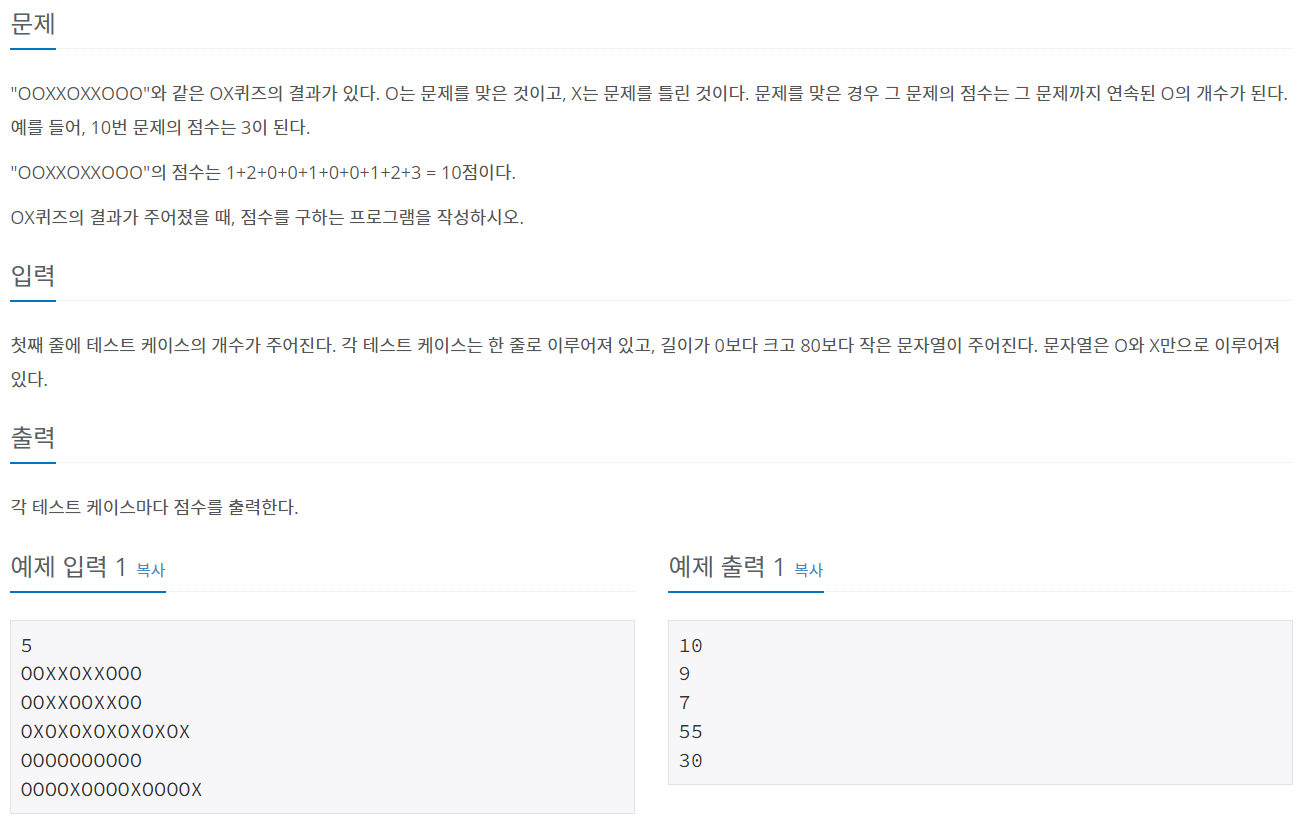https://www.acmicpc.net/step/6
1차원 배열 단계
OX 퀴즈의 결과를 일차원 배열로 입력받아 점수를 계산하는 문제
www.acmicpc.net
# 10818 : 최소, 최대

# 10818
n = int(input())
n_list = list(map(int, input().split()))
print(min(n_list), max(n_list))굳이 n을 입력 받을 필요가 없는 문제이지않나...?
# 2562 : 최댓값

n_list = []
for i in range(9):
a = int(input())
n_list.append(a)
print(max(n_list))
print(n_list.index(max(n_list))+1)# 3052 : 나머지

n_list = []
for i in range(10):
n_list.append(int(input()) % 42)
print(len(set(n_list)))- set()
- 집합에 관련된 자료형. 순서가 없으며, 중복이 없는 자료형
- 합집합, 교집합, 차집합 같은 집합 연산을 지원
# 1546 : 평균

n = int(input())
n_list = list(map(int, input().split()))
m = max(n_list)
new_n_list = [i/m*100 for i in n_list]
print(sum(new_n_list) / len(new_n_list))- list comprehension
- 리스트에 어떤 기능/문법을 내포
- 리스트에 변수 생성, 할당 등을 for문, if문 등을 포함해 쉽고 짧게 한줄로 직관적인 프로그램을 만들 수 있는 문법
- [(리스트에 넣을 값) for문/if문 등]
# ex1 : n_list의 값들 i에 대해 i/m*100 연산을 수행한 값들로 리스트를 만들어라
new_n_list = [i/m*100 for i in n_list]
# ex2 : src_tmp의 값들 i에 대해 만약 i가 src_vocab에 없다면 i를 리스트에 넣어라
src_oov = [i for i in src_tmp if i not in src_vocab]
# ex3 : scr_tmp의 값들 i에 대해 만약 i가 src_oov에 없다면 i를, 그렇지 않다면 '<UNK>'를 리스트에 넣어라
src_tmp = [i if i not in src_oov else '<UNK>' for i in src_tmp]# 8958 : OX퀴즈

n = int(input())
for i in range(n):
ox = input()
score = 0
o_score = 0
for j in ox:
if j == "O":
o_score += 1
score += o_score
else:
o_score = 0
score += 0
print(score)o_score로 연속된 "O"의 개수를 세어줌. "X"가 등장했을 때 o_score를 0으로 초기화해주어야 함.
# 4344 : 평균은 넘겠지

c = int(input())
for i in range(c):
n_score = list(map(int, input().split()))[1:]
n_mean = sum(n_score) / len(n_score)
result_list = [i for i in n_score if i > n_mean]
result = len(result_list) / len(n_score) * 100
print("{:.3f}%".format(result))- 문자열 포맷
- "{:.3f}%".format(result) : result의 소수점 셋째 자리까지 출력
- [파이썬 문자열 포맷] 이 글을 참고하였습니다.
파이썬 문자열 포맷
파이썬 문자열 다루기 파이썬 문자열 포맷 방식 파이썬에서 문자열 포맷을 지정하는 방식은 3가지가 있습니다. 1. % 연산자 2. format() 메서드 3. 리터럴 문자열 'f' 첫 번째 % 연산자를 사용하는 것
captainbin.tistory.com
'Algorithm > BAEKJOON' 카테고리의 다른 글
| [BAEKJOON] 단계별로 풀어보기 6. 문자열 (1) | 2022.10.01 |
|---|---|
| [BAEKJOON] 단계별로 풀어보기 5. 함수 (0) | 2022.09.16 |
| [BAEKJOON] 단계별로 풀어보기 3. 반복문 (0) | 2022.09.10 |
| [BAEKJOON] 단계별로 풀어보기 2. 조건문 (0) | 2022.09.09 |
| [BAEKJOON] 단계별로 풀어보기 1. 입출력과 사칙연산 (0) | 2022.09.09 |



